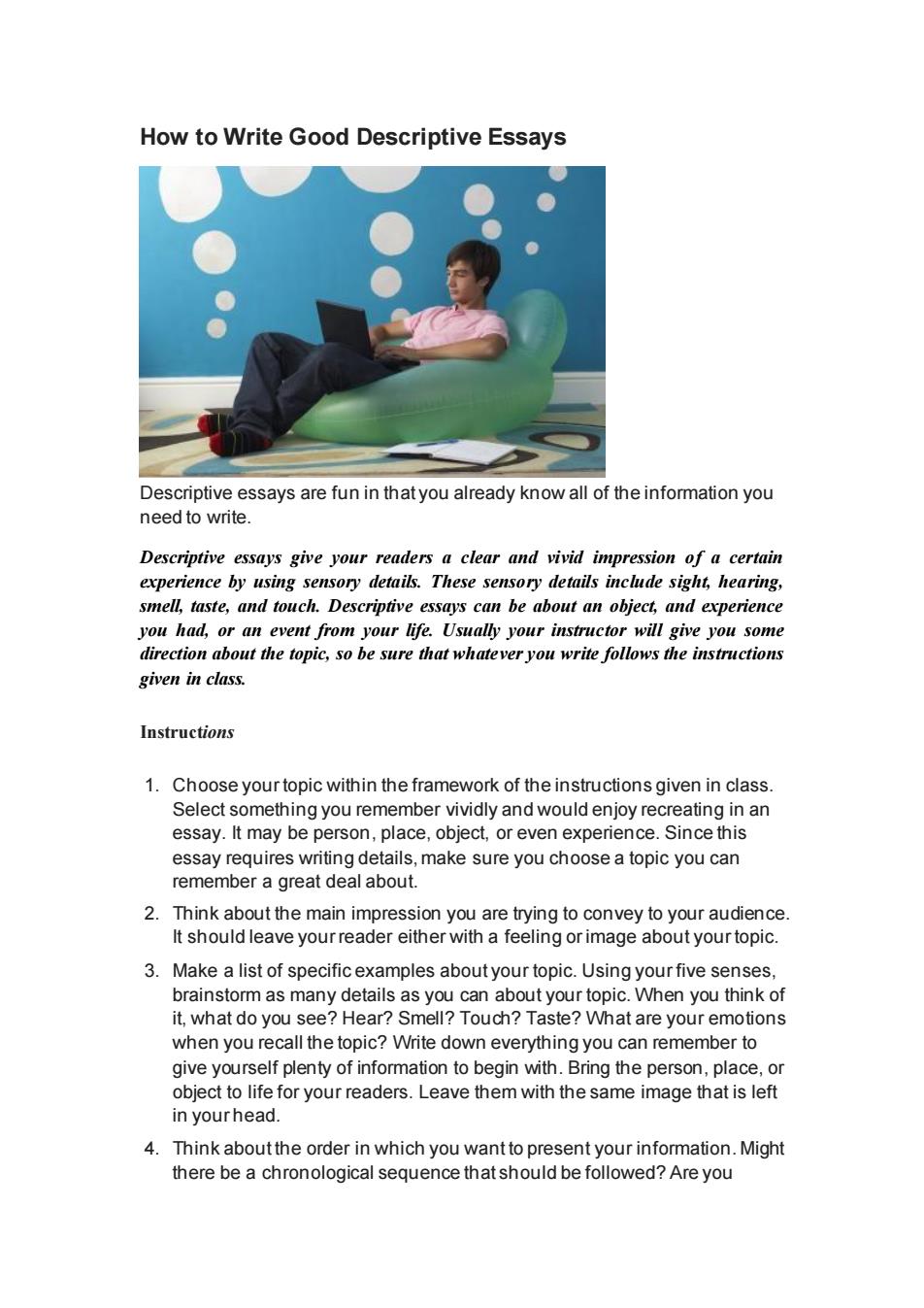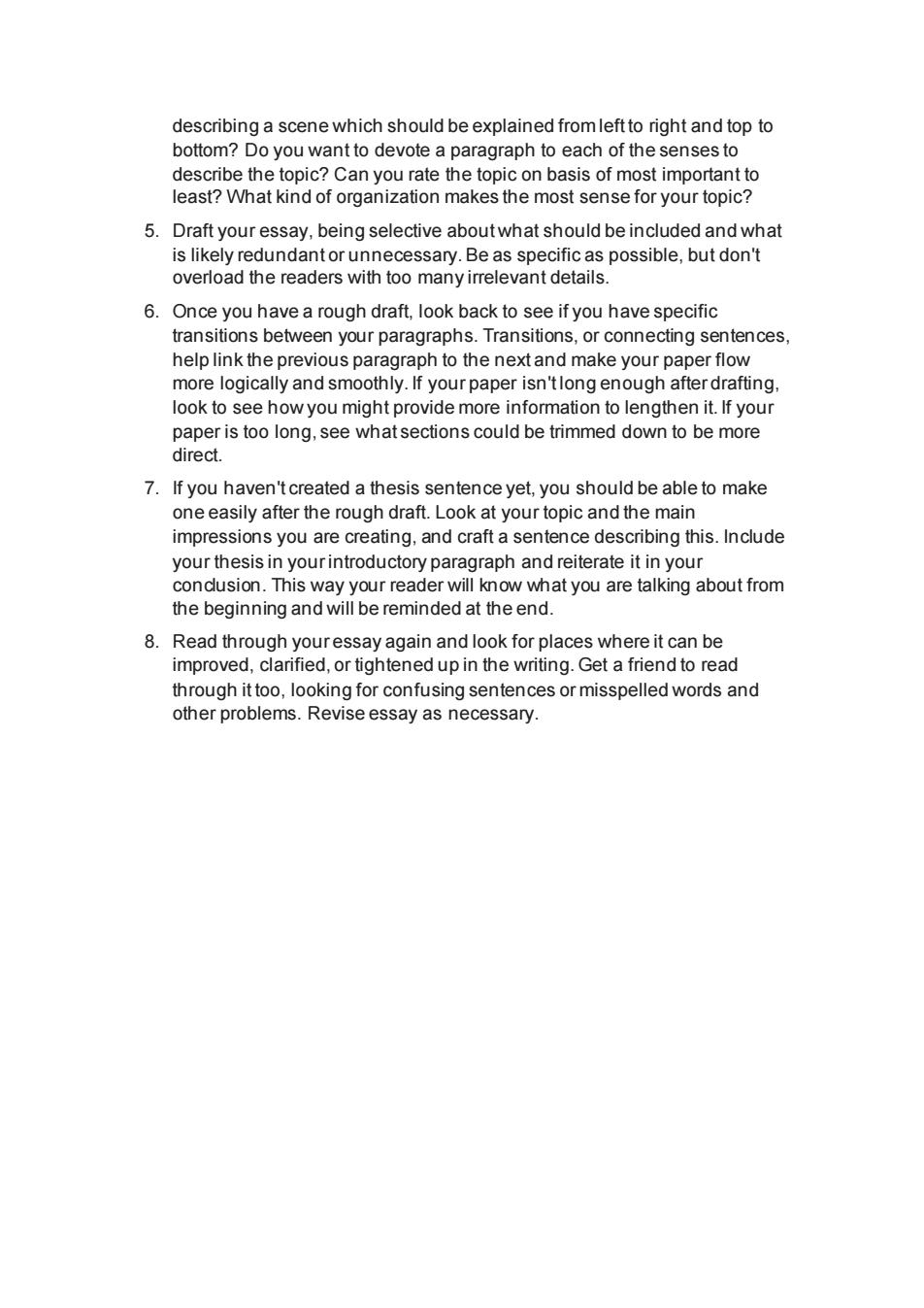
How to Write Good Descriptive Essays Descriptive essays are fun in that you already know all of the information you need to write. Descriptive essays give your readers a clear and vivid impression of a certain experience by using sensory details.These sensory details include sight,hearing, smell,taste,and touch.Descriptive essays can be about an object,and experience you had,or an event from your life.Usually your instructor will give you some direction about the topic,so be sure that whatever you write follows the instructions given in class. Instructions 1.Choose your topic within the framework of the instructions given in class Select something you remember vividly and would enjoy recreating in an essay.It may be person,place,object,or even experience.Since this essay requires writing details,make sure you choose a topic you can remember a great deal about. 2.Think about the main impression you are trying to convey to your audience. It should leave your reader either with a feeling or image about your topic. 3.Make a list of specific examples about your topic.Using your five senses, brainstorm as many details as you can about your topic.When you think of it,what do you see?Hear?Smell?Touch?Taste?What are your emotions when you recall the topic?Write down everything you can remember to give yourself plenty of information to begin with.Bring the person,place,or object to life for your readers.Leave them with the same image that is left in yourhead 4.Think about the order in which you want to present your information.Might there be a chronological sequence that should be followed?Are you
How to Write Good Descriptive Essays Descriptive essays are fun in that you already know all of the information you need to write. Descriptive essays give your readers a clear and vivid impression of a certain experience by using sensory details. These sensory details include sight, hearing, smell, taste, and touch. Descriptive essays can be about an object, and experience you had, or an event from your life. Usually your instructor will give you some direction about the topic, so be sure that whatever you write follows the instructions given in class. Instructions 1. Choose your topic within the framework of the instructions given in class. Select something you remember vividly and would enjoy recreating in an essay. It may be person, place, object, or even experience. Since this essay requires writing details, make sure you choose a topic you can remember a great deal about. 2. Think about the main impression you are trying to convey to your audience. It should leave your reader either with a feeling or image about your topic. 3. Make a list of specific examples about your topic. Using your five senses, brainstorm as many details as you can about your topic. When you think of it, what do you see? Hear? Smell? Touch? Taste? What are your emotions when you recall the topic? Write down everything you can remember to give yourself plenty of information to begin with. Bring the person, place, or object to life for your readers. Leave them with the same image that is left in your head. 4. Think about the order in which you want to present your information. Might there be a chronological sequence that should be followed? Are you

describing a scene which should be explained from left to right and top to bottom?Do you want to devote a paragraph to each of the senses to describe the topic?Can you rate the topic on basis of most important to least?What kind of organization makes the most sense for your topic? 5.Draft your essay,being selective aboutwhat should be included and what is likely redundant or unnecessary.Be as specific as possible,but don't overload the readers with too many irrelevant details. 6. Once you have a rough draft,look back to see if you have specific transitions between your paragraphs.Transitions,or connecting sentences, help link the previous paragraph to the next and make your paper flow more logically and smoothly.If your paper isn'tlong enough after drafting, look to see how you might provide more information to lengthen it.If your paper is too long,see what sections could be trimmed down to be more direct. 7.If you haven't created a thesis sentence yet,you should be able to make one easily after the rough draft.Look at your topic and the main impressions you are creating,and craft a sentence describing this.Include your thesis in your introductory paragraph and reiterate it in your conclusion.This way your reader will know what you are talking about from the beginning and will be reminded at the end. 8.Read through youressay again and look for places where it can be improved,clarified,or tightened up in the writing.Get a friend to read through it too,looking for confusing sentences or misspelled words and other problems.Revise essay as necessary
describing a scene which should be explained from left to right and top to bottom? Do you want to devote a paragraph to each of the senses to describe the topic? Can you rate the topic on basis of most important to least? What kind of organization makes the most sense for your topic? 5. Draft your essay, being selective about what should be included and what is likely redundant or unnecessary. Be as specific as possible, but don't overload the readers with too many irrelevant details. 6. Once you have a rough draft, look back to see if you have specific transitions between your paragraphs. Transitions, or connecting sentences, help link the previous paragraph to the next and make your paper flow more logically and smoothly. If your paper isn't long enough after drafting, look to see how you might provide more information to lengthen it. If your paper is too long, see what sections could be trimmed down to be more direct. 7. If you haven't created a thesis sentence yet, you should be able to make one easily after the rough draft. Look at your topic and the main impressions you are creating, and craft a sentence describing this. Include your thesis in your introductory paragraph and reiterate it in your conclusion. This way your reader will know what you are talking about from the beginning and will be reminded at the end. 8. Read through your essay again and look for places where it can be improved, clarified, or tightened up in the writing. Get a friend to read through it too, looking for confusing sentences or misspelled words and other problems. Revise essay as necessary